Atherosclerotic cardiovascular disease (ASCVD)
Cardiovascular disease is the leading cause of mortality worldwide, accounting for an estimated 18 million deaths per year.1
In Belgium, cardiovascular disease:
- Is responsible for more than a quarter (28%) of all deaths2
- Causes more than 31000 deaths each year2
Most cardiovascular disease cases can be prevented by addressing behavioral risk factors, such as:1,4
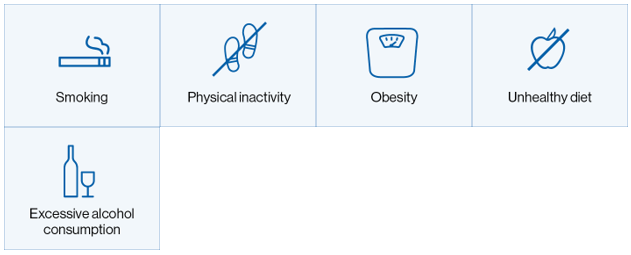
Other risk factors include:3,5,6,7
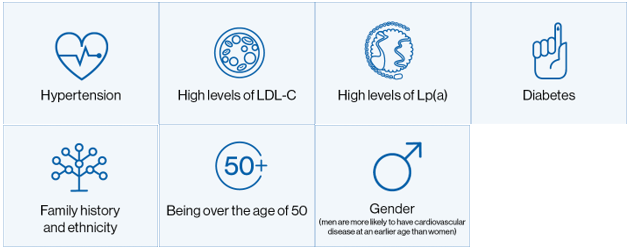
Atherosclerotic cardiovascular disease, a type of cardiovascular disease, that is caused by dyslipidemia and the accumulation of lipoproteins within the arterial wall, which leads to the formation of atherosclerotic plaques. These plaques grow due to continued accumulation of lipoproteins and the proliferation of smooth muscle and fibrous tissue. All these factors contribute to narrowing of the artery, with subsequent plaque rupture and thrombosis.8 Depending on the location of the obstruction, this can cause a number of cardiovascular conditions, including: coronary heart disease, stroke, and peripheral arterial disease.9
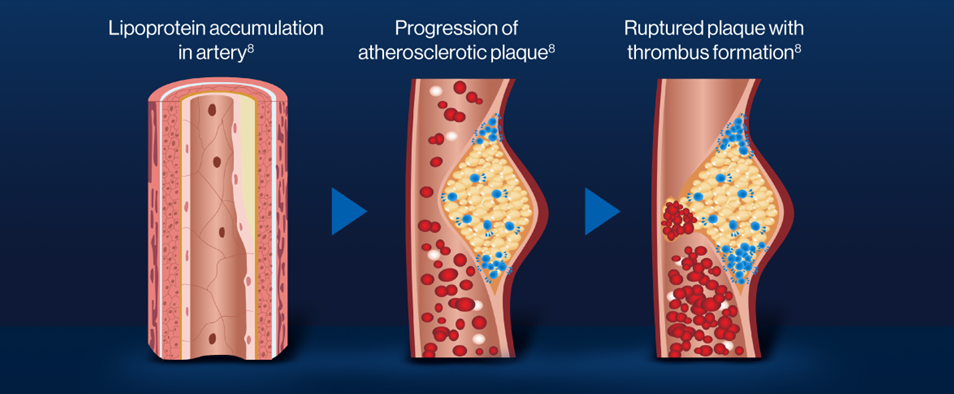
The risk of atherosclerotic cardiovascular disease is increased in patients with familial hypercholesterolemia (FH) – a common autosomal inherited disorder affecting around one in 250 people.10 Individuals with FH have a higher risk of premature ASCVD and death than the general population.10,11 FH is usually caused by mutations in the gene encoding the LDL receptor. It confers a significant risk for premature cardiovascular disease (CVD). FH is caused by defects in the low-density lipoprotein receptor (LDLR) pathway, resulting in elevated LDL-cholesterol (LDL-C) concentrations that are largely resistant to caloric restriction, weight loss and physical exercise interventions in affected individuals..10
The risk of experiencing an acute atherosclerotic cardiovascular disease event rises rapidly as more ApoB-containing lipoproteins – for example, LDL-C and Lp(a) – become retained and atherosclerotic plaque burden increases.12
LDL-C goals for primary and secondary prevention12
LDL-C-lowering interventions are recommended for both the primary prevention of atherosclerotic cardiovascular disease and the secondary prevention of recurrent cardiovascular events.
The 2019 ESC/EAS guidelines recommend a risk-based approach with more aggressive LDL-C goals for those at higher risk of ASCVD.12
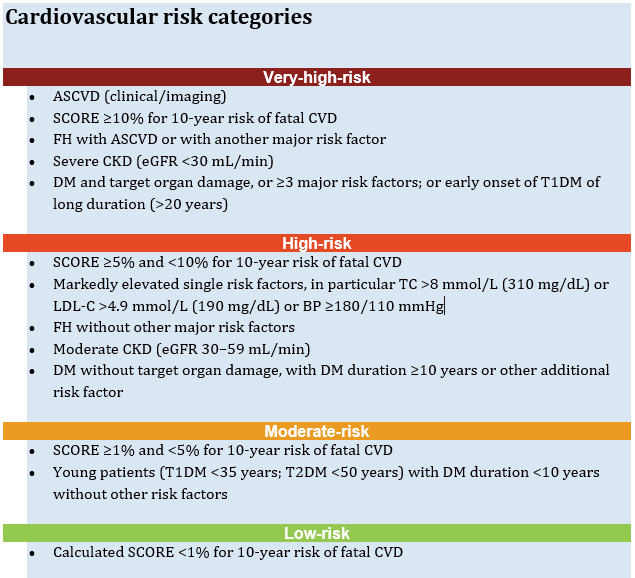
Adapted from Mach F et al. 2020.12
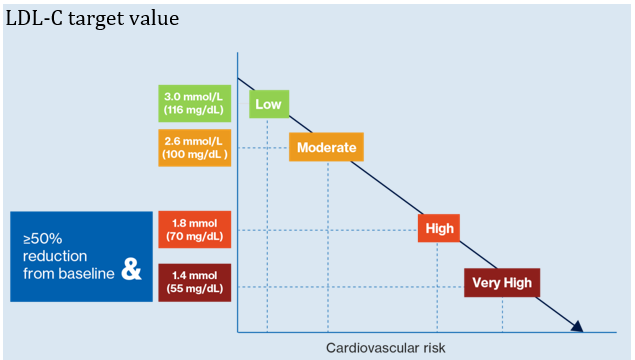
Adapted from Mach F et al. 2020.12
For more information, refer to the guidelines here.
ApoB, apolipoprotein B; ASCVD, atherosclerotic cardiovascular disease; BP, blood pressure; CKD, chronic kidney disease; CVD, cardiovascular disease; DM, diabetes mellitus; eGFR, estimated glomerular filtration rate; ESC/EAS, European Society of Cardiology/European Atherosclerosis Society; FH, familial hypercholesterolemia; LDL, low-density lipoprotein; LDL-C, low-density lipoprotein cholesterol; Lp(a), lipoprotein(a); NHS, National Health Service; SCORE, Systematic Coronary Risk Estimation; TC, total cholesterol; T1DM, type 1 diabetes mellitus; T2DM, type 2 diabetes mellitus
- WHO. Cardiovascular diseases. Available at: https://www.who.int/health-topics/cardiovascular-diseases#tab=tab_1 .
- WHO Belgium data. Available at : https://www.who.int/nmh/countries/bel_en.pdf?ua=1
- Rachel Hajar, M.D, Risk Factors for Coronary Artery Disease: Historical Perspectives
- WHO. Cardiovascular diseases (CVDs). Available at: https://www.who.int/news-room/fact-sheets/detail/cardiovascular-diseases-(cvds) .
- NHS. Cardiovascular disease. Available at: https://www.nhs.uk/conditions/cardiovascular-disease/ .
- Tsimikas S. J Am Coll Cardiol 2017;69:692–711.
- Tsimikas S et al. J Am Coll Cardiol 2018;71(2):177–192.
- IntechOpen. Dyslipidemia and its role in the pathogenesis of atherosclerotic cardiovascular disease: implications for evaluation and targets for treatment of dyslipidemia based on recent guidelines. Available at: https://www.intechopen.com/chapters/66725 .
- National Research Council (US) Committee on Diet and Health. Atherosclerotic Cardiovascular Diseases (19) in Diet and Health: Implications for Reducing Chronic Disease Risk, 1989. National Academies Press (US).
- Leo E Akioyamen, Jacques Genest, et al. Estimating the prevalence of heterozygous familial hypercholesterolaemia: a systematic review and meta-analysis
- Hu P et al. Circulation 2020;141(22):1742–1759.
- Mach F et al. Eur Heart J 2020;41(1):111–188.


